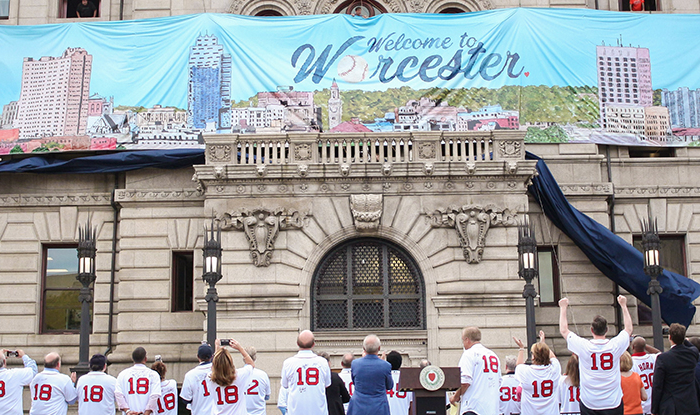Pioneer recognizes students’ thoughtful approach to stadium financing, adjacent redevelopment in Worcester
Even as the construction of Polar Park, a new minor league baseball stadium in Worcester, Massachusetts, was plagued by cost overruns, Worcester city officials aimed to use “no existing city tax revenue…to fund the ballpark construction.” Instead, they would essentially pay for the nearly-$100 million project by levying additional property taxes on adjacent development that was slated to sprout up around the new stadium. But as COVID-19 has dampened demand for hotel rooms and office space, and the developer has revised estimates for the apartments’ completion dates and market values, the stadium’s financing could look very different going forward.
This fall’s Pioneer Institute & Nichols College Sports Management Policy College Case Competition asked students to craft adaptive solutions to the Polar Park project’s financial troubles. The winning team, consisting of Brian Krentzman, Nick Petkewich, and Justin Valletta, all undergraduates at UMass Amherst, has provided such solutions in a report entitled “Maximizing Polar Park.”
Specific proposals of the UMass students include that the stadium host corporate events, high school tournaments, concerts, and other recreational activities to boost revenue year-round. An oral presentation delivered by the students to the judges during the competition emphasized the potential to refinance the project to either expand the special tax district used to garner public revenue or solicit additional private funding.
John T. Peculis, Senior Vice President of Commercial Lending at Fidelity Cooperative Bank and one of the competition’s judges, seemed particularly impressed with the team’s oral presentation, calling them “emphatic” and “in command” of the material. The competition’s other judges included Ryan Meagher, Season Ticket Sales Manager at the Worcester Red Sox, Dave Peterson, General Manager of the Worcester Bravehearts, and Ellen Roy Herzfelder, former Massachusetts Secretary of Environmental Affairs and current member of the Pioneer Institute Board of Directors.
Additional recommendations proposed by the winning team involve creating “premium” sales and amenities at Polar Park and prioritizing building “everything the players/fans see.” The UMass students go on to suggest that, as long as substantial construction delays of the new stadium itself do not materialize, the team could save money they would have put towards securing a temporary home stadium elsewhere.
As a prize for their achievements, the winning team will receive a $2,000 prize to split among the team members, and their full proposal for enhancing the viability and timeliness of Polar Park’s construction is available here.



